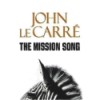Book Review
Back into the heart of darkness
John le Carre's 20th novel, The Mission Song, shows that the authors voice is as strong and compelling as ever.
Robert McRum
 |
The Mission Song by John le Carre Hodder £17.99, pp340 |
First things first: this is John le Carre's 20th novel, the latest volume in a remarkable oeuvre that stretches back to Call for the Dead (1961) and The Spy Who Came in From the Cold (1963), a modern classic set in a fictional European landscape that now seems almost as remote as the Thirty Years' War. Remarkably, a generation and several revolutions on, he remains close to the top of his game. The Wall has come down, the Evil Empire is at one with Nineveh and Tyre, but there are still dragons to slay under an alien sun.
In The Mission Song, his latest exploration of those eternal le Carre themes - the corrosions of secrecy and betrayal; the hypocrisies of power - he is still, impressively, striving to be fresh and original. Few novelists half his age would have the nerve to challenge Conrad and locate their plot in that 'heart of darkness', Congo. Fewer still would chance so much on the first-person narration of a 'zebra', a half-Irish, half-Congolese interpreter, Bruno Salvador, or 'Salvo', a name that seems like an explicit declaration of intent. This is the first time le Carre has completely surrendered narrative omniscience and, at one level, it's a roll of the dice that benefits the reader with a bravura performance. Le Carre, who has always been able to 'do the police in different voices' and, coincidentally, loves reading aloud from his work, inhabits his interpreter's mind and character with imaginative zest. In this new disguise, he can riff happily on the nuances of language, interpretation and eavesdropping while inexorably exposing the lineaments of a shabby African coup.
At the political level, The Mission Song, in a subtle homage to Greene as well as Conrad, animates a plot that might have been torn from the pages of a newspaper, and which bears some resemblance to the so-called Wonga Coup in Equatorial Guinea. Occasional false notes only occur when this thriller element intersects with the novel's adulterous romance, Salvo's affair with black nurse, Hannah.
Part of the intention of this ambitious novel is to marry suspense with a quasi-comic allegory about intelligence in the age of the internet, but still, to an exceptional degree, The Mission Song is as angry about the exploitation of Africa as The Constant Gardener, as polemical about multinational greed, as prescient about Congo's blood-crazed militias, and as passionate as any of his recent novels about Western duplicity. The exposure of Salvo's innocence drives the plot with remorseless energy to a haunting resolution. At 74, le Carre's eye is undimmed, his passion for his craft as strong as it ever was. He delivers a tale that few could equal and none will surpass. In The Mission Song, he has made the heart of darkness his own. If Salvo is not Marlow, the good news is that his master's voice is as strong and compelling as ever.
This article first appeared in The Observer.
Copyright (R) thedailystar.net 2006 |
